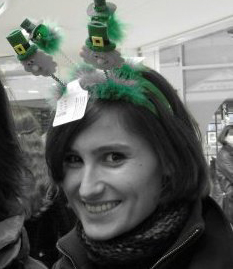The lady in the bank squinted at my passport.
“Were you born in Dublin or in Baile Átha Cliath?” she asked.
“They’re the same place,” I said. “Baile Átha Cliath is the Irish word for Dublin.
She paused. “Can I just fill in Dublin?”
“Sure!”
“Thank Goodness. It’s much shorter,” she said, beginning to tap on her computer.
Earlier at the town hall, where I had gone to register with the police (it’s a blanket requirement rather than a sign of criminality here) I was seen by a woman whose sister had married a Northern Irish man.
“He comes from Coleraine,” she said. “But I still haven’t got around to visiting.”
I felt compelled to tell her about the wildness of the west, the incessant drizzle and the friendliness of our people.
“Now I really want to go!” she said.
I told her she should.
Just in time for my move back to Berlin, the Irish Times is concerned this week with the relationship between the Germans and the Irish. In their aptly-titled series “A German Complex,” journalists are writing about Kerrygold and the idyllic German view of the Irish.
As the product of a German-Irish relationship and a literature graduate, my favourite article in the series so far has no doubt been the descriptions of the Irish by German writers and poets.
I was personally flattered by Heinrich Heine’s opinion, expressed in 1828, that an “amalgamation of the two elements would produce something excellent” and was strangely moved by Johann Georg Kohl’s conclusion in 1842 that “this island of misfortune and discontent, this country of so many incongruities otherwise unknown in the rest of Europe – can quite justly be called, like Prospero’s, an island of wonders.”
The observation which really stopped me in my tracks came from Philipp Andreas Nemnich in 1806, who found that “the Irish often express themselves too obligingly. They seem never to be able to turn down a request, and yet they never keep their promises, no matter how often one reminds them.”
I recognised myself immediately. Like many of my fellow Irish, I too am inflicted by a rather pleasant disposition. I find myself smiling at strangers and being very polite even to people I dislike. I make offers I expressly do not wish to be taken up and then curse myself when they are accepted.
All that wouldn’t be so bad if I simply didn’t bother to keep my promises, as Nemnich claims most Irish people fail to do. But I have inherited the unfortunate trait of reliability from my mother and invariably end up keeping the promises I did not wish to make.
I wonder what Philipp Andreas Nemnich would make of me.
I was asked earlier this year to carry out a Vox Pop in Berlin to find out what German people thought of Ireland. The old stereotypes prevailed: Guinness, green pastures and traditional music were the most common responses.
There’s a lot they know less about here though. Our wonderful writers for one. Our excellence in cultivating potatoes. Our uncomplicated kindness alongside our cynicism and repression.
The poor lady at the bank now knows about our national language though. Then again, she’ll find that out as soon as she lands at Dublin airport and is greeted by a poster of the beaming Westlife lads and a “Fáilte” signpost.
I love the Irish language, but don’t get me started on the signposting in Dublin airport…
So to all our potential German tourists, I hope you enjoy your stay as much as I enjoy recommending it.
Go n-Éirí and bóthar leat because the road signs sure won’t bring you any luck.

